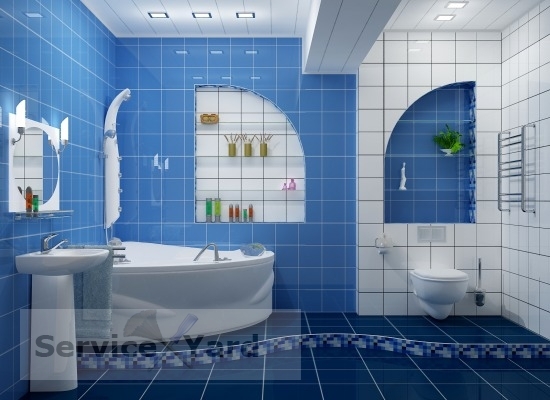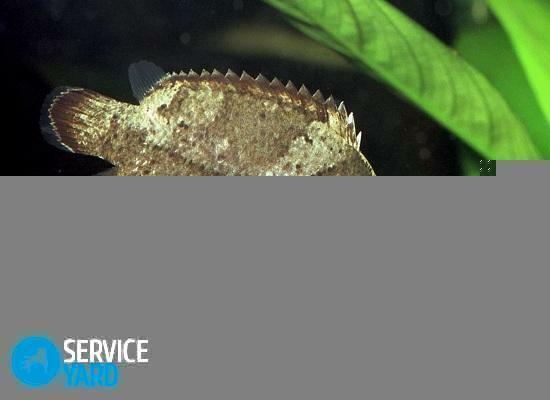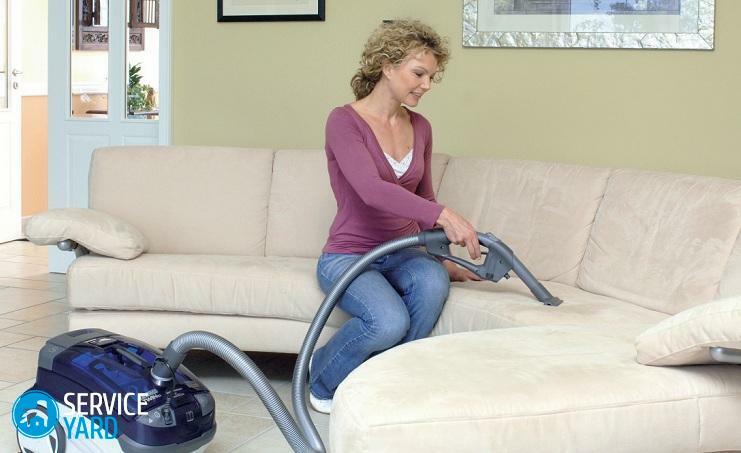
- Where to start?
- How to clean the samovar?
- How do I clean an old samovar?
- How do I clean a brass samovar?
- How do I clean a brass samovar?
- How to clean the samovar from stainless steel?
- How can I clean any samovar from the outside?
- How to clean the scum of samovar?
- Useful advices
Modern electric kettles can save a lot of time, but how can they compare with a drink with a delicate taste, prepared in a real samovar? Of course not! Therefore, if you have such a relic in the house and you use it, you definitely need to know how to clean the samovar at home. Only in this way it will work properly, and the taste of tea will not deteriorate from scale and green plaque.
to the contents ↑Where to start?
Before you start to purge your samovar, specify its age and the material from which it was made. If your samovar is old, seen species, it is most likely made of copper or brass. Perhaps it's expensive and in your hands it may very well be a real antiques. Carefully see if there is a brand on the surface of the manufacturer.
Important! Found out clearly old, poorly readable inscriptions? Before attempting to influence the samovar in any mechanical way, take it for evaluation to an antiquarian specialist. He should look at the thing and be sure to enlighten you on the subject of how much your "miracle of technology" can cost. If the amount is not prohibitive - you can safely clean the samovar at home and use it as much as you like. Have noticed that the antiquarian became agitated and began persistently to offer to buy a family relic? Think about it - maybe you just put a rarity on the shelf and brag about it before your neighbors.
How can I clean the samovar from the outside?
Please note that light patina on copper products is allowed, moreover - it gives the product an old and noble look. If you find a dense layer of gray-green color on the surface or individual parts, this means that the metal is in the active oxidation stage.
Important! Do not attempt to remove the plaque yourself. Refer to a professional restorer - he will return your things a radiant look.
The stains and dirt are insignificant and the samovar is not in such a deplorable state? Try to cope on your own.
to the contents ↑How to clean the samovar?
Before proceeding to this important event, check the contents of your lockers. In the kitchen or in the home medicine cabinet, you will certainly find the right tools. It can be:
- flour;
- table salt;
- vinegar;
- soda;
- lemon;
- citric acid;
- liquid ammonia;
- tooth powder;
- medical alcohol;
- potato cleaning;
- carbonated drinks( Coca-Cola, Sprite, Fanta).
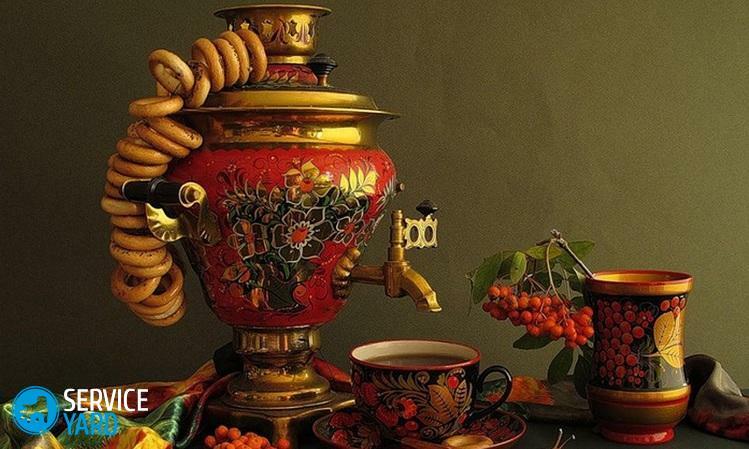
For more serious cleaning of the surface you will have to acquire such substances as:
- GOI paste;
- oxalic acid;
- acetic acid;
- petrol;
- calcined soda.
To process the samovar, you will need the following materials:
- rubber gloves;
- felt;
- soft flannel fabric;
- clean x-b rag;
- crumpled newspaper;
- brush;
- kitchen sponge or washcloth;
- bucket.
How to clean an old samovar?
Do not advise you to apply "grandmother's" methods. This is the old mistress competed with each other, whose samovar shines more. To clean it, river sand or "brick dust"( grated brick) was used. Such abrasive substances, maybe, are effective, but the look of your rarity after their application will not be very attractive - "tainted" and all in scratches.
To begin with, try to use gentle cleaning agents, and only as a last resort, use toxic chemicals or mechanical cleaning with polishing.
Important! It is advisable to disassemble the samovar before cleaning: remove the handles, crown, stand, cock, key.
to the contents ↑How to clean a copper samovar?
Copper samovar can be cleaned by one of the following methods. Choose a more convenient for you, based on the tools that are "at hand."
Method 1
- Prepare a mixture of flour, coarse salt and vinegar.
- Wipe the surface of the samovar.
- Polish with a soft cloth or a piece of crumpled newspaper.
Method 2
- Take a slice of lemon.
- Wipe the samovar from the outside.
- Brush with a brush.
- Wash with water.
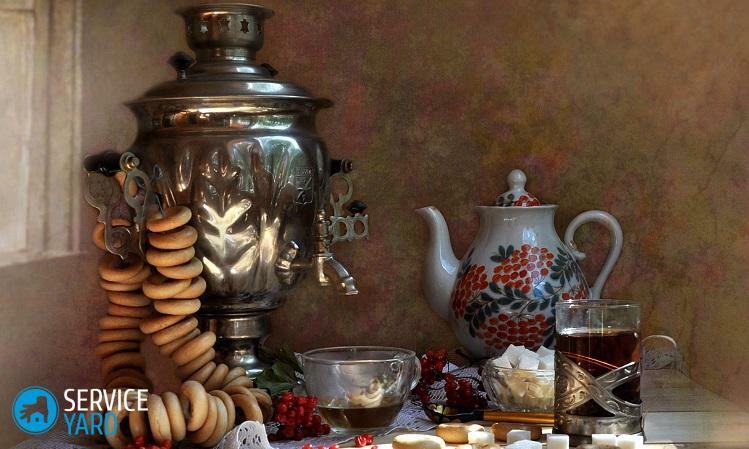
Method 3
Use a solution of acetic acid( 5-10%):
- Wear gloves.
- Moisten a piece of soft cloth in a solution of acetic acid.
- Clean the surface.
- Rinse with a damp cloth.
- Wipe dry.
Important! To clean small parts of the samovar from copper, boil them for 30 minutes in a solution of soda ash( 20g per 0.5 liter of water).
to the contents ↑How do I clean a brass samovar?
Other means are suitable for this alloy. The principle of their use is described in detail below.
Option 1
- Take liquid ammonia.
- Apply to a soft cloth flap.
- Clean the surface.
Option 2
- Wear rubber gloves.
- Dilute 200g of oxalic acid in 1 bucket of water.
- Apply to the surface of the samovar for 5 minutes.
- Rinse with cold water.
- Brush with baking soda.
- Rinse again with water.
- Wipe dry with a soft cloth.
How to clean the samovar from stainless steel?
If you have purchased a new stainless steel samovar, be prepared for the fact that it can also fade and become stained over time. Try to clean it in the simplest way:
- Moisten the cotton swab with a 9% vinegar solution.
- Thoroughly clean the surface.
- Polish with a piece of soft cloth.
How to clean any samovar outside?
Universal cleaning agents for metal products also exist. Use them if you already have them in stock.
Solution 1
GOI paste will clean and brighten both copper and brass products:
- Take a piece of GOI paste.
- Rub it on felt or a soft flannel cloth.
- Apply to the surface.
- Wipe clean.
- Polish to shine.
- Remove any residues from the paste with gasoline or medical alcohol.
Important! Paste the paste on the surface gradually - and immediately wipe. After processing a small area, proceed to the next. Thoroughly dissolve and wash the remainder of the paste from the depressions on the surface.
Solution 2
Tooth powder and ammonia also give a good cleansing effect:
- Take 50g of cold water.
- Dissolve 15 g of tooth powder.
- Add 30 g of 10% ammonia solution.
- Stir.
- Apply the mixture on a piece of soft cloth.
- Wipe the surface and polish.
How to scrape the samovar?
Once you have mastered the external cleaning, proceed to update the samovar from the inside. First of all, you have to cope with a scum that spoils the taste of tea.
Method 1
- Take the potato peelings.
- Rinse well under running water.
- Put in the samovar.
- Fill with cold water.
- Boil for about 30 minutes.
- Leave for 2-3 hours.
- Remove the cleaning.
- Rinse out the samovar with clean water.
- Wipe the inside with a washcloth with a small amount of soda to remove the debris.
- Pour water into the samovar.
- Boil again.
- Allow to cool.
- Drain, repeat if necessary.
Method 2
- Take a soda - "Sprite", "Coca-Cola" or "Phantom".
- Pour into the samovar.
- Boil for 30 minutes.
- Drain the liquid.
- Remove the softened scum with a brush.
- Wash the inside with running water.
- Repeat the procedure if necessary.
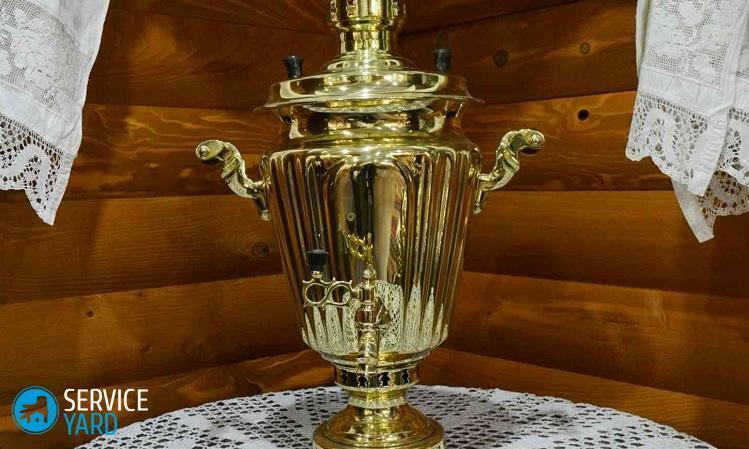
Method 3
- Pour cold water inside.
- Add 2-3 packets of citric acid.
- Boil.
- Leave for half an hour.
- Pour out the solution.
- Clean the samovar from the inside with a kitchen sponge, removing the debris.
- Fill with clean water.
- Let it boil.
- Drain the water.
- Repeat the action again.
Method 4
- Fill the samovar with 2/3 cold water.
- Add 1/3 9% vinegar solution.
- Boil.
- Leave it for about 2 hours.
- Drain the water.
- Wash the kitchen sponge with debris.
- Fill with clean water.
- Let it boil.
- Drain.
- Repeat 2-3 times to wash the vinegar residue.
Useful tips
- Regularly clean the samovar - both outside and inside.
- After use, always drain the remaining water to prevent salts from depositing on the walls and to prevent the appearance of scale.
- Brass samovars do not tolerate moisture, so store them only in dry, warm rooms.
- Do not allow gray-green plaque to appear on copper samovars.
- Do not use abrasive cleaners to clean the surface.
We hope that our simple tips will help you to clean the samovar at home efficiently and carefully. Enjoy your tea drinking!

